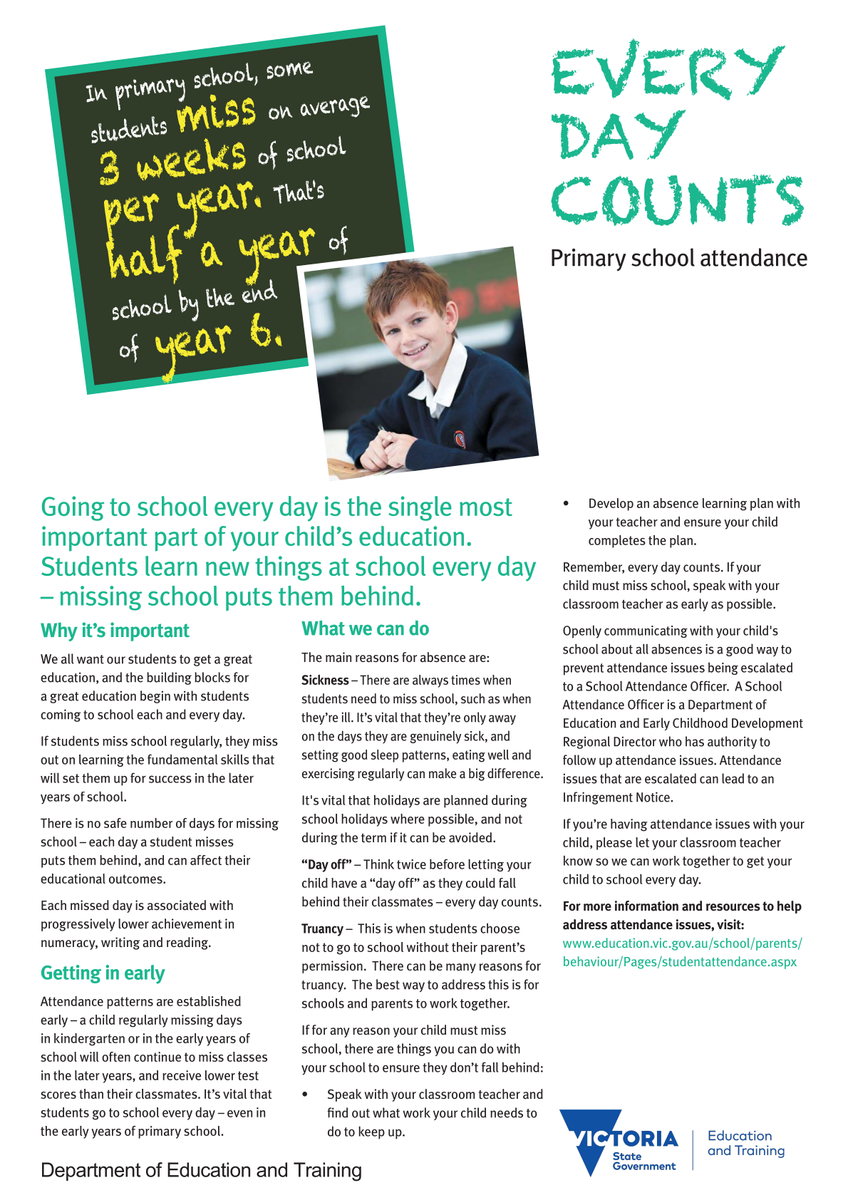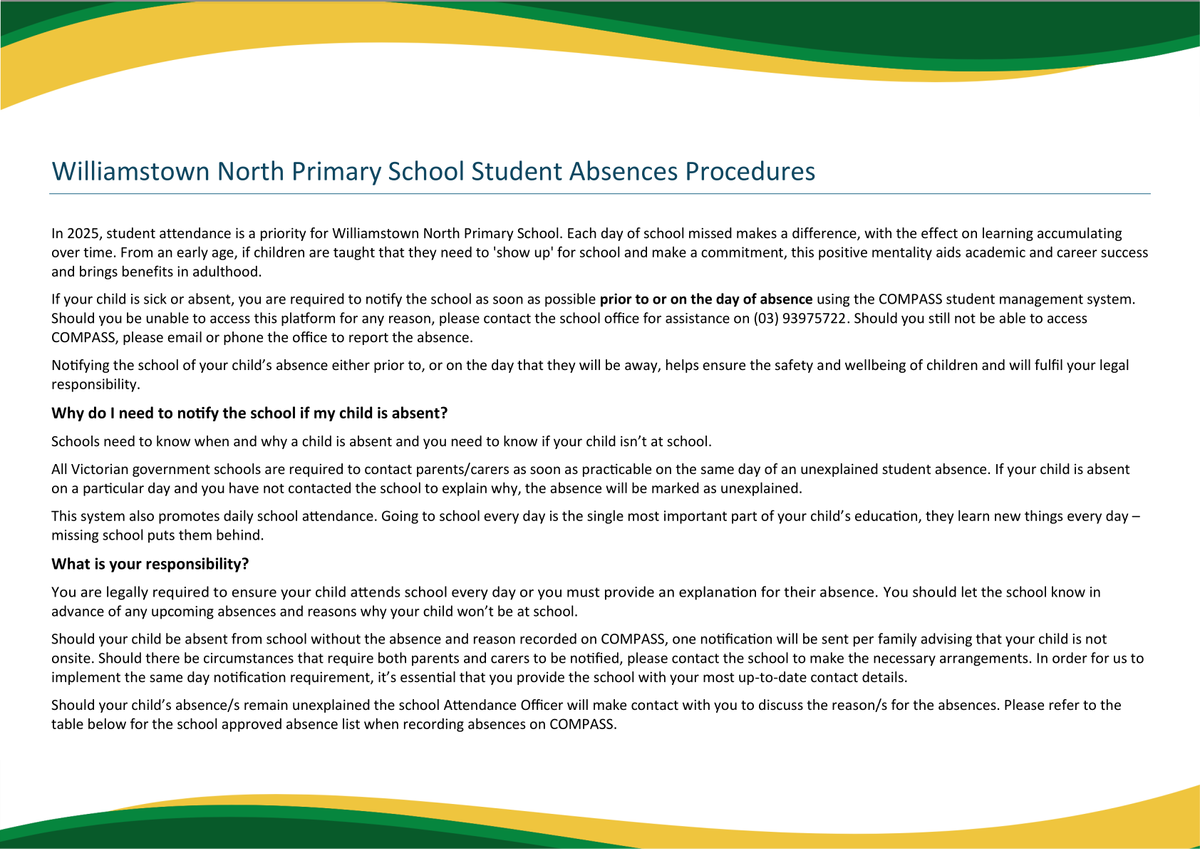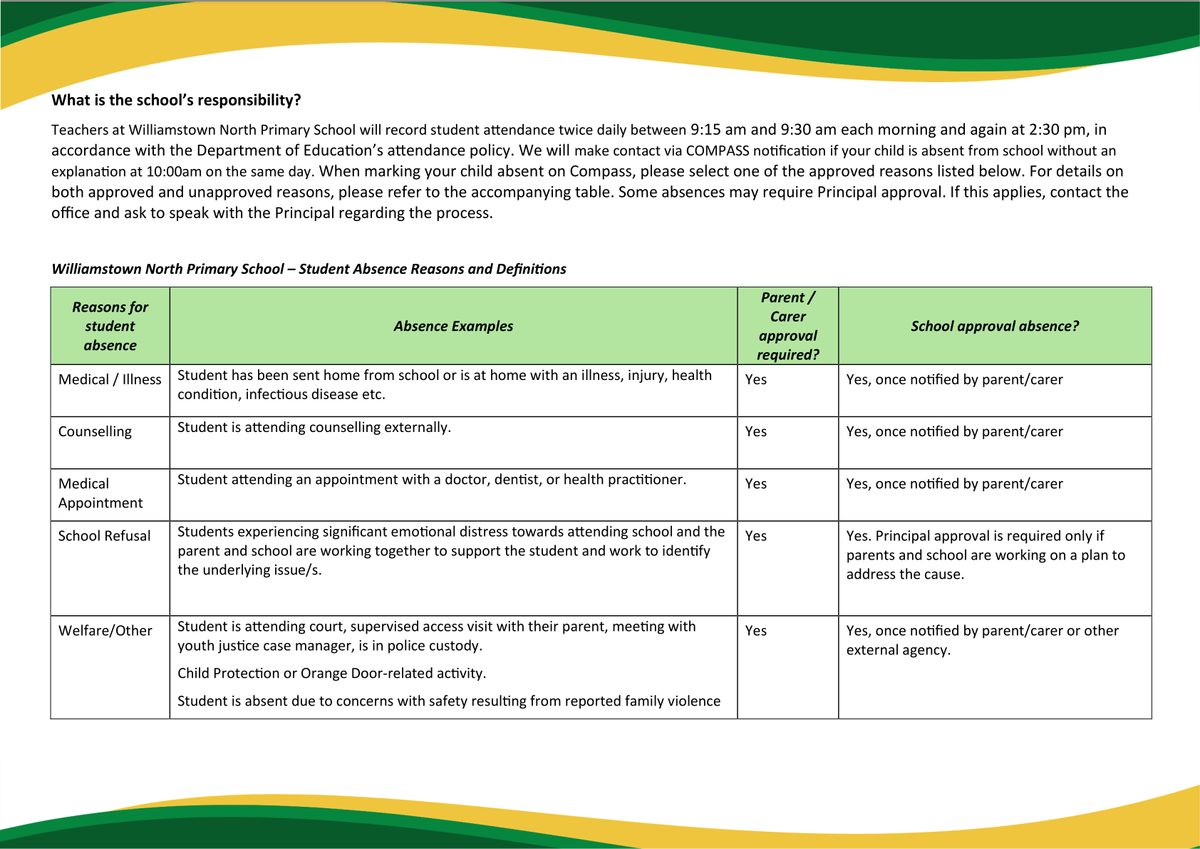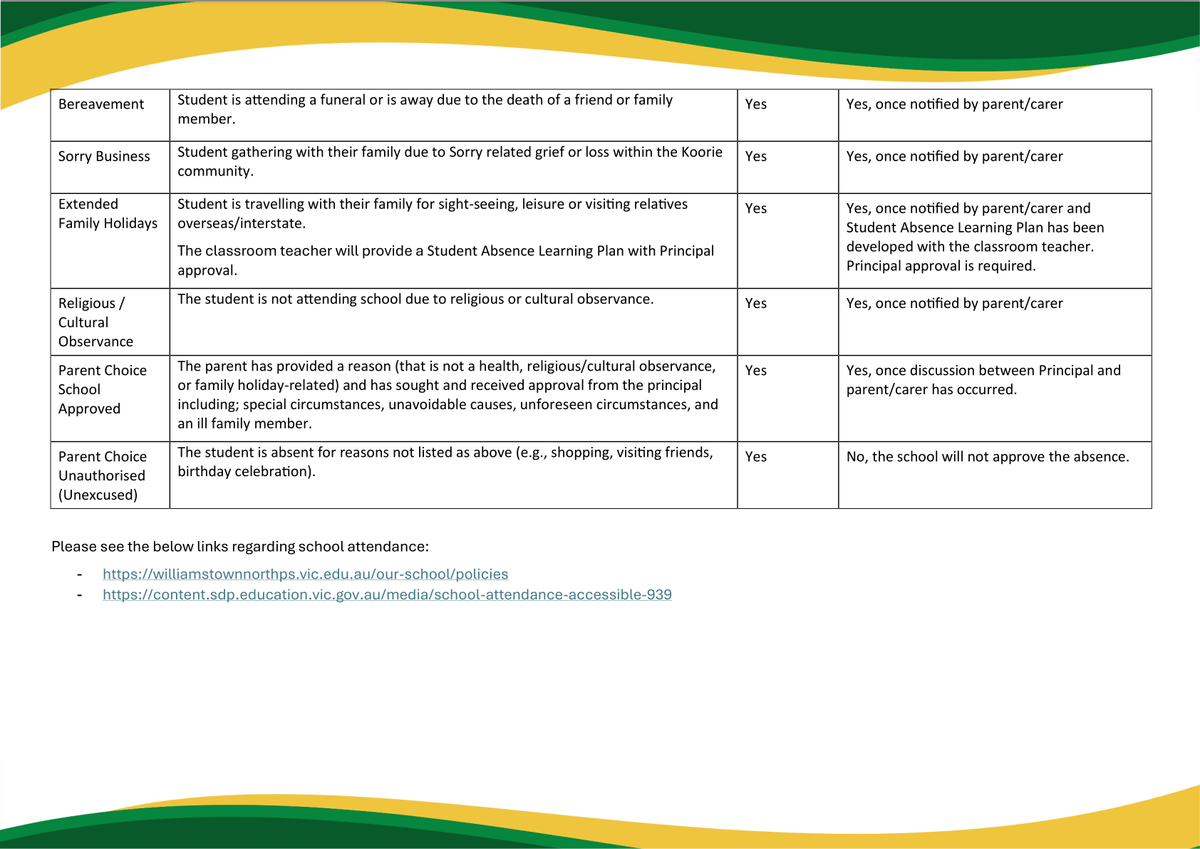Attendance

Exciting News: Introducing Our School Attendance Trophies!
Dear Parents and carers,
At Williamstown North Primary School, we understand the profound impact regular attendance has on a child's academic and social development. To celebrate and encourage consistent school attendance, we are thrilled to introduce a new Attendance Rewards Program!
Celebrating Attendance Achievements: Starting this term, we will be recognising and rewarding the class with the highest attendance rate in two cohorts: Prep-Year 2 and Grades 3-6. Every fortnight at our school assembly, one class from each cohort will be awarded a trophy for their outstanding attendance. This trophy will be proudly displayed in the winning classroom, serving as a symbol of their commitment to school attendance.
Congratulations to the first winners of the attendance trophies:
6D - Mrs Lawler’s class.
2D - Mr Roosenboom’s class.
Why Attendance Matters: Studies consistently show that regular attendance is a key factor in successful school outcomes. Children who attend school regularly are more likely to catch up with the curriculum and participate actively in school activities. This not only boosts their academic performance but also enhances their social skills, helping them build and maintain friendships and feel more connected to their school community.
We Need Your Support: We encourage all our students to attend school regularly. However, we understand that sometimes there can be challenges that affect attendance. Should you have any concerns or if your child is experiencing difficulties that might impact their ability to attend school, please do not hesitate to reach out. Our Attendance Officer and classroom teachers are here to support you and discuss any assistance you might need.
Together, let's make every school day count and support our children in achieving their best, both academically and socially. We are excited to see which classes will lift the trophy next assembly!
Thank you for your continued support and cooperation in fostering an environment where every student can thrive.
Cyber Safety at Williamstown North Primary School
Dear Parents and Carers,
In today's digital age, ensuring the safety of our students online is more important than ever. At Williamstown North Primary School, we are committed to help support and promote a safe and responsible online environment for all our students. This involves not only educating the students about the potential risks, but also empowering parents with the resources to support safe internet use at home.
Understanding Cyber Safety: Cyber safety refers to the safe and responsible use of the internet and digital devices, including smart phones, tablets, and computers. It is essential for protecting children from harmful content, cyberbullying, and other online risks. By fostering a culture of cyber safety, we can help our students develop the skills and knowledge they need to navigate the digital world securely and confidently.
Resources for Parents: To assist you in supporting your child’s digital journey, we’ve curated a list of resources that offer valuable information and practical tips on cyber safety:
eSafety Commissioner - The Australian Government’s eSafety Commissioner provides a wealth of resources on online safety, including advice on managing screen time, dealing with cyberbullying, and understanding different social media platforms. Visit: https://www.esafety.gov.au/
ThinkUKnow Australia - A partnership between Australian Federal Police, Microsoft Australia, Datacom, and the Commonwealth Bank, ThinkUKnow offers great resources for parents and schools on how to stay safe online. Check out their resources at https://www.thinkuknow.org.au/
Kids Helpline - A free, private, and confidential phone and online counselling service for young people aged 5 to 25, ideal for discussing any worries about online interactions. Learn more at: https://kidshelpline.com.au/
Encouraging Safe Online Practices: We encourage you to explore these resources and discuss the importance of cyber safety with your children. Teach them about the importance of keeping personal information private, understanding the content they post or share, and coming forward if they encounter anything online that makes them uncomfortable.
The Role of Parental Controls: As our children navigate the world of online social media and internet use, it is crucial to implement and manage parental controls on their devices. These tools can help you monitor and restrict content that may not be suitable for their age and ensure that their online interactions are safe and positive. Parental controls are particularly vital in the early stages of learning about online activities, providing an additional layer of safety while they build their understanding and judgment.
Thank you for your continued support and commitment to maintaining a safe and respectful learning environment for all our students.
Warm regards,
Matt Feeley
Well-being and Attendance Officer
EVERY DAY COUNTS
Going to school every day is the single most important part of your child’s education. Students learn new things at school every day – missing school puts them behind.
SCHOOL IS BETTER WHEN YOUR CHILD IS THERE.
Why it’s important.
We all want our students to get a great education, and the building blocks for a great education begin with students coming to school each and every day.
If students miss school regularly, they miss out on learning the fundamental skills that will set them up for success in the later years of school. There is no safe number of days for missing school – each day a student misses puts them behind, and can affect their educational outcomes. Each missed day is associated with progressively lower achievement in numeracy, writing and reading.
Getting in early
Attendance patterns are established early – a child regularly missing days in kindergarten or in the early years of school will often continue to miss classes in the later years, and receive lower test scores than their classmates. It’s vital that students go to school every day – even in the early years of primary school.
IN VICTORIA SCHOOL IS COMPULSORY FOR CHILDREN AND YOUNG PEOPLE AGED 6 -17 YEARS
Student Absences
The main reasons for absence are:
Sickness – There are always times when students need to miss school, such as when they’re ill. It’s vital that they’re only away on the days they are genuinely sick, and developing good sleep patterns, eating well and exercising regularly can make a big difference.
Family Holidays - It's vital that holidays are planned during school holidays where possible, and not during the term. If you are planning to go on holiday during term time, make sure that you talk to your child’s school in advance, and work with them to develop an absence learning plan.
“Day off” – Think twice before letting your child have a “day off” as they could fall behind their classmates – every day counts.
Truancy – This is when students choose not to go to school without their parent’s permission. There can be many reasons for truancy. The best way to address this is for schools and parents to work together.
School Refusal - School refusing children will experience significant emotional distress not only when going to school but also at the thought of going to school; they may be absent from school for weeks or even months at a time. School refusal differs from truancy as children generally stay home with the knowledge of the parents and despite their best efforts to encourage their child to go to school. If for any reason your child must miss school, there are things you can do with your school to ensure they don’t fall behind: Inform the school by calling 9397 5722 OR, enter into Compass.
* Speak with your child’s classroom teacher and find out what work they need to do to keep up.
- Develop an absence learning plan with your teacher and ensure your child completes the plan.
Remember, every day counts. If your child must miss school, speak with your classroom teacher as early as possible. Openly communicating with your child's school about all absences is a good way to prevent attendance issues being escalated to a School Attendance Officer.
A School Attendance Officer is a Department of Education Director who has authority to follow up attendance issues. Chronic or ongoing attendance issues that are escalated can lead to an Infringement Notice being issued to parent/s.
If you’re having attendance issues with your child, please let your classroom teacher know so we can work together to get your child to school every day.
Top attendance tips for parents
* Schools want to work in partnership with parents – act early if you have any concerns by contacting your child’s school and asking for advice and support.
* Remember that every day counts.
* There is no safe number of days for missing school – each day a student misses puts them behind, and can affect their educational outcomes and their social connectedness.
* Talk positively about school and the importance of attending every day.
* Open and prompt communication with your child’s school about all absences is a good idea.
* Avoid making routine medical and dental appointments during the school day or planning family holidays during the term.
* Seek help from your school if you are concerned about your child’s attendance and wellbeing. Schools want to work in partnership with parents to support student attendance and wellbeing.



